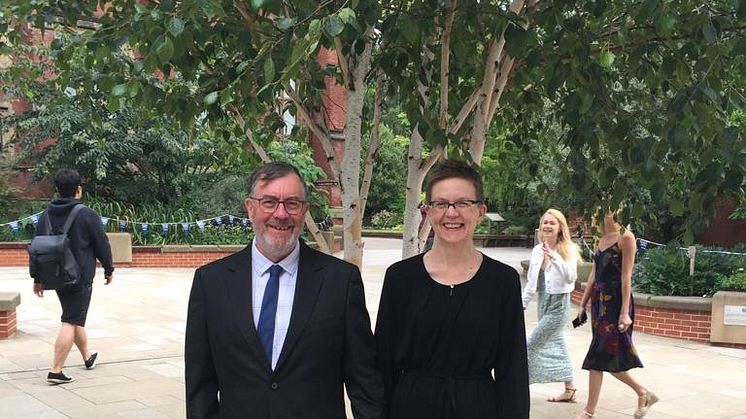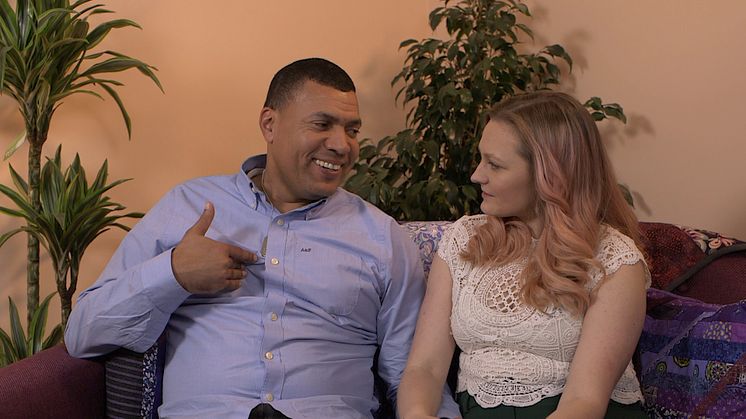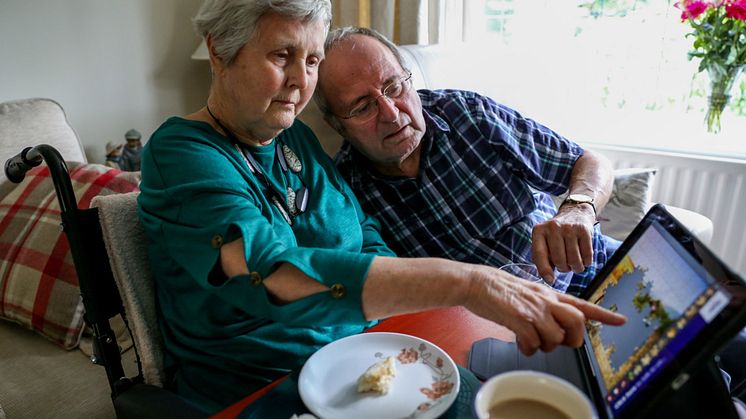
Press release -
Carers at breaking point: UK stroke carers go without vital support
One in five (19%) people caring for stroke survivors have not accessed any form of help after their lives were turned upside down overnight, according to new figures published today by the Stroke Association.
The charity has also found that 40% of stroke carers who had been caring for more than three years report feeling exhausted and around 1 in 3 stressed or anxious . Despite this, more than a third of people caring for stroke survivors (35%) receive no emotional support, with a devastating impact on their health and well-being.
There are currently over 1.2 million stroke survivors in the UK and this number is predicted to rise to 2.1 million in 2035. The charity is warning that stroke carers are coming under increasing pressure to manage their own daily needs while caring for their loved ones, and the situation is likely to get worse.
The Stroke Association’s Lived Experience report is the UK’s largest ever survey of people affected by stroke (i) with over 11,000 responses. The third chapter (of four), Caring for a stroke survivor: what carers need, reveals:
- Stroke carers are struggling to cope: almost half (47%) of the carers who did not have any support said that they were not offered any help, or did not know where to start.
- Stroke carers are feeling isolated: Over a quarter (27%) of carers said there were not enough support groups for them.
Jenny Dibden, (55) from Sheffield, found her life took a completely unexpected turn when her husband Mark, had a major stroke in June 2013.

Jenny said: “Mark’s stroke left him unable to; walk, lift his right arm, use his right hand, read or write, and he was barely able to speak. Mark went from independence to dependence in an instant.”
Mark received care at the Royal Hallamshire Hospital, Sheffield and after three months of rehabilitation returned home.
Jenny said: “When the stroke first happened, in my head I probably said a few times - I’m only 48, I wasn’t expecting life to take this turn. All your expectations and plans about how your life is going to be are thrown up in the air and you have no idea what the future holds.
“At a practical level, there’s clearly a huge burden on spouses for care, supporting the children, running the household and making the finances stack up.”
Jenny and Mark have five daughters together, the youngest two were aged 7 and 11 years, and the older three were, 14, 16 and 20 years old, at the time of Mark’s stroke.
“After Mark had the stroke I promised the girls I would do everything I could to not let it impact their lives. I wrote a two-month plan within a couple of days of the stroke, there was so much to do and so much at risk that it was a way to get focused, get organised and keep calm – failure was not an option.
“I never reached out for any professional help or support services for myself as I thought Mark’s situation was so much worse, it didn’t feel quite right, and I expected myself to be able to cope. In many ways I did cope but not asking for help increased the pressure I felt.”
Soon after Mark’s stroke, Jenny was faced with the devastating emotional impact the stroke had on him, as Mark experienced depression and had suicidal thoughts.
Jenny adds: “We’ve had a huge amount of support from relatives and friends but fundamentally, having a stroke and being a spouse is a pretty lonely existence.
“You need to give yourself permission – or be given advice – to have some time out, just 30 minutes to go and have a cup of tea outside the house while someone looks after your loved one.
“In the six years since Mark’s stroke, I’ve learned you must be extremely polite and robust in accessing the services your family member needs, you’re their only real advocate.
“I received email offers of help from the Stroke Association plus an at home visit to discuss options.
“Volunteers also came and did some gardening. The front garden was like a jungle as we’d not been able to do anything. It made the whole family feel so much better when it was cleared.
“You should also accept offers of help from family and friends, they can really help you get through.”
Jenny adds: “As a carer, I was faced with some tricky moral questions - how do you navigate issues such as consent, power of attorney, control of money and making big decisions when you’re dealing with cognitive damage?
“When does a marital tiff with your spouse who now has some cognitive difficulties stray into bullying?
“Is it okay to tell your spouse they need to occasionally remember they’re a parent as well as a stroke survivor?
“At the time I just wrestled with the questions in my own head. It might have been good to talk to other carers about how they felt about these things.”
In February 2015, Mark returned to work as a Stage Electrician at Sheffield City Hall, with reduced hours, altered duties and other reasonable adjustments and now works 18.5 hours a week.

Jenny said: “Mark has made major improvements in his speech, functionality and social skills. It took huge physical, mental and emotional effort, it was a massive achievement and not at all expected by the doctors.”
Juliet Bouverie, Chief Executive of the Stroke Association, said: “Lives change in an instant after a stroke. Overnight, a partner becomes an unpaid carer. We know that thousands of people all over the UK are dedicating their lives to caring for loved ones, whose speech, independence, emotional wellbeing or personality could be affected after a stroke. And as these new figures show, over time, taking on the role of carers often comes at the cost of their own health. Sadly, far too many people are facing this devastating situation alone and unsupported.
“The number of stroke survivors is set to rise by almost one million people by 2035. So this problem is only set to get worse.”
The Lived Experience of Stroke report exposes the realities of living with stroke. The Stroke Association wants everyone affected by stroke to have access to the support that they need, when they need it. There are currently over 1.2 million stroke survivors in the UK, and over half (62%) of those surveyed said they had relied on the help of an unpaid carer at some point since their stroke. The findings also reveal that:
- Stroke carers are facing financial hardship: over a quarter (27%) of carers said they did not receive enough support on Carer’s Allowance/benefits.
- Caring for stroke survivors is not shared equally between women and men, with more women (68%) taking on the role of carer.
Juliet continues: “Carers need support, advice and information to help them balance caring while taking care of their own well-being. We need to make sure that every person who cares for a stroke survivor has the right emotional, financial and practical support in place. For example, every carer is entitled to a Carer’s Assessment(ii) from their local authority, to make sure they have the help and support they need.”
Emily Holzhausen OBE, Director of Policy and Public Affairs at Carers UK, said: “Suddenly taking on care for a family member who has experienced a stroke can be a whirlwind of change, with carers having to adapt quickly but often unaware of where to turn to for support.
“Enduring high levels of stress and exhaustion, many carers see their finances worsen and find it difficult to prioritise their own needs, continuing their caring role without support.
“Unpaid carers and the people they care for urgently need better quality support and access to services. The Government must deliver plans for social care reform that ensure carers get the practical and financial support they need to care without putting their lives on hold.”
The Stroke Association provides support and information for people who have been affected by stroke. We provide carers with information on how to request a carer’s assessment. We also offer Life After Stroke Grants for short breaks for carers and support through our Stroke Helpline (0303 3033 100), My Stroke Guide, Stroke Recovery Service and our education programme, Caring and You.
For more information visit: www.stroke.org.uk
For more information about the Lived Experience of Stroke report – Caring for a stroke survivor: what carers need - visit www.stroke.org.uk/livedexperience
Topics
- Stroke strikes every five minutes in the UK and it changes lives in an instant.
- The Stroke Association is a charity working across the UK to support people to rebuild their lives after stroke. We believe that everyone deserves to live the best life they can after stroke. From local support services and groups, to online information and support, anyone affected by stroke can visit stroke.org.uk or call our dedicated Stroke Helpline on 0303 3033 100 to find out about support available locally.
- Our specialist support, research and campaigning are only possible with the courage and determination of the stroke community and the generosity of our supporters. With more donations and support, we can help rebuild even more lives.
- You can follow us on Twitter, Facebook and Instagram.



